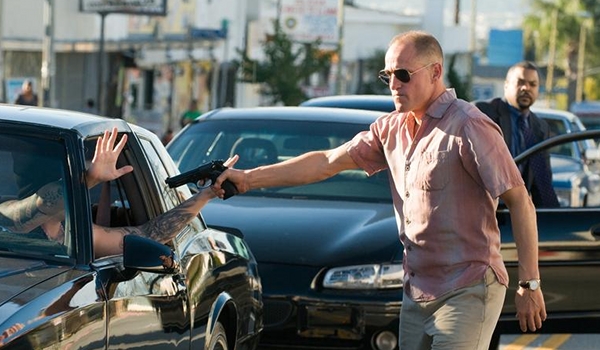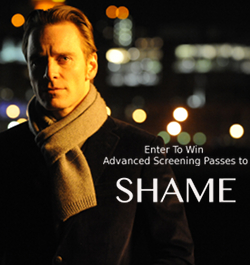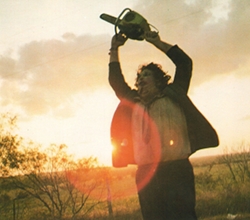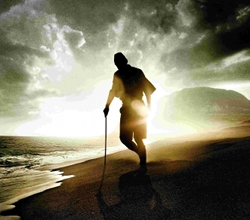Review: Rampart (2011)
Dave Brown rides through the streets of Los Angeles – day and night, he patrols the landscape, the same dreary expression on his face. A cigarette perpetually hangs from his mouth, unless he is taking swigs from the bottle of whiskey he keeps in his patrol car. His sunglasses are always securely placed over his eyes, for he would never expose the wilting soul underneath. They are his fortress, his “rampart,” against a city he views – and that views him – with utter contempt.
Dave is the centerpiece of Oren Moverman’s blistering Rampart, one of the most acute and unflinching descents into hell you’re ever likely to see. The film is a character study that avoids grand-scale events and labyrinthine plot mechanics; its tragedy is the end result of a burgeoning collective of intimate personal failures. There are accents of traditional police procedural, but they serve more as reference points in a film that admires crime genre conventions while ultimately eschewing them to focus on the dying soul of a renegade cop as his world collapses.
A veteran officer in LA’s controversial Rampart division, Dave (Woody Harrelson) is relentlessly “old school,” to put it mildly. More directly, he is a consistently inebriated, explosively violent, virulently hateful cop whose racism is thinly veiled and whose sexism isn’t veiled at all. He is, of course, entirely unrepentant for any of his crushing “vices.” His nickname is “Date Rape Dave,” in reference to a lingering accusation that Dave murdered a serial date rapist in the name of “street justice.” Dave always carefully skirts the issue, but his demeanor says it all – he is endlessly arrogant, openly prejudiced, and defiant against anything that stands in his way.
Yet the façade drops when the uniform comes off. In a uniquely bizarre living situation, Dave resides with his two daughters and their mothers – who happen to be sisters. First he married one, then the other, but now all are living under the same roof. At home, Dave isn’t the commanding stag he plays on the job simply because he isn’t permitted to be – the two sisters (Anne Heche and Cynthia Nixon) regard him with passing bemusement, and his eldest daughter (Brie Larson) actively hates him. Dave acts like an untouchable giant while on duty, but at home he is pathetic and needy, rejected by the people he loves.
The character is brazenly explicit in his public rage, yet details of his inner workings are conveyed with subtlety and grace by the screenplay, by Moverman and James Ellroy. Dave’s attempts at bonding with his daughters and reconciling with one (or both) of his former wives are futile. He picks up women at seedy bars, all of whom eventually cool to his manufactured charms. Even on the job, the only attention Dave attracts is from those investigating him for various crimes – all of them violent, most inextricably tied to racism. If not for his reckless disregard for human decency, Dave would just be another dinosaur, one more old school cop carrying on in futility long after wearing out his welcome. Harrelson is absolutely amazing in this role, achieving a depth of humanity that is unlikely to be matched by any other performance this year. He is a vicious, nasty livewire, quick to explode and impossible to repress…yet he is also an emotional stooge, desperately seeking legitimacy and affection in his personal life. Harrelson embodies this profoundly complicated, deeply contradictory character in all its human subtleties. It is one of the most powerful and revelatory performances of the year.
In just two films as a director, Moverman’s thematic obsessions are fully apparent. His debut, 2009’s The Messenger, was the most incisive and revelatory film about the modern soldier that I have ever seen. Now he delivers with the most searing portrait of a dirty cop I’ve ever seen. Rampart is not as tender in its observations as The Messenger, but of course it wouldn’t be; Dave’s soul is tortured in more violent ways, with precious little capacity for redemption. It also isn’t as fully realized, with supporting characters that are thinly drawn, for they only exist in the vacuum of Dave’s desperate tunnel vision. The film is myopic, but that’s the point – Dave has receded into his own damaged consciousness to the point that his only option is to rage blindly against the machine.
Ellroy’s screenplay contributions are unmistakable. The details of internal police corruption and the hard-boiled minutiae of those who perpetuate it could be lifted directly from his novels. But Moverman uses that material as a mere backdrop, the stage on which he sets more intimate personal drama. Similarly, his expressive visual style encases Dave’s intense personal turmoil in a crime drama shell. Rampart is full of swooping crane shots and frenetic hand-held camerawork that mirror the aesthetic of traditional police procedurals, but they are just visual reference points playing on conventional expectations. Moverman saves his most intimate visual work to show Dave isolated, solitary, a man lost in a shifting reality. He is a repugnant, crooked cop, but that is just tertiary; his human tragedy runs far deeper, and he will likely never escape.
-
John













 Review: Outrage (2010)
Review: Outrage (2010) Subversive Saturdays: Unglassed Windows Cast a Terrible Reflection
Subversive Saturdays: Unglassed Windows Cast a Terrible Reflection Review: Hugo (2011)
Review: Hugo (2011) Review: The Muppets (2011)
Review: The Muppets (2011) Review: The Muppets (2011)
Review: The Muppets (2011)





